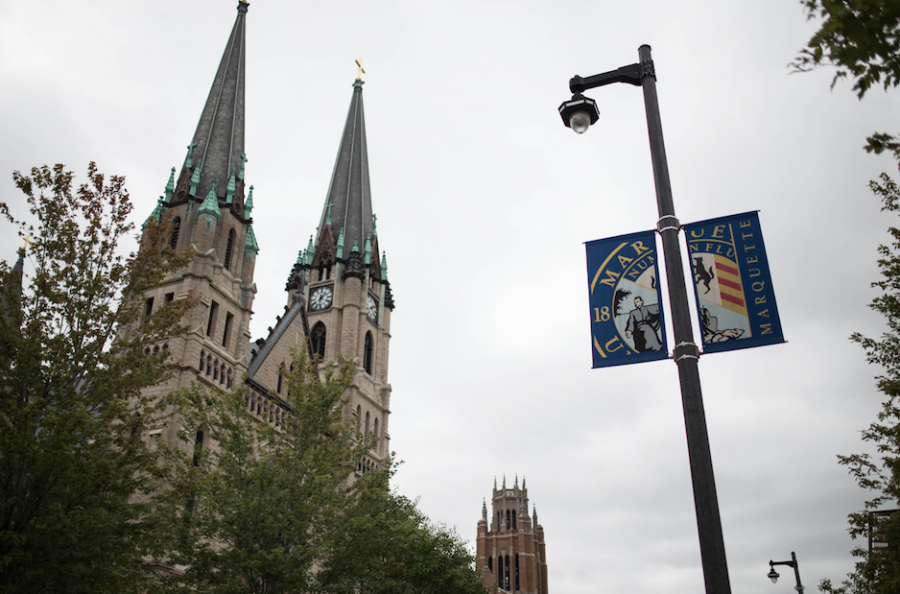
Photo by Maryam.Tunio / maryam.tunio@marquette.edu
The university administration has prioritized the encouragement of diversity and inclusivity. On their face these seem laudable goals, but in actual practice they are less so. The overemphasis of inclusivity can become repressive. The desired goal of diversity is lost when openness to opposing positions is eliminated, leaving a lowest common denominator form of politically correct diversity that is not true diversity at all. True diversity involves some level of conflict. There must be toleration in any diverse environment, but there must also be something left to tolerate. Toleration implies disagreement.
We are now being told that certain topics and conversations are not acceptable. The university has even required training by its employees (including all faculty) on these points. It states that even being overheard by a third party discussing certain topics (e.g. gay marriage) constitutes harassment. Such logic is utterly one-sided in favor of the agenda of those putting the system in place. In such logic restricting the speech of individuals who are respectfully expressing and discussing views that diverge from the announced agenda of the enforcers is not harassment. It is only harassment when any “protected” parties or interests are violated by such expressions. It is harassment when the powers that be declare said topic to be so, and not harassment for other issues not on their agenda.
Welcome to the world of the politically correct. When calls for inclusivity and diversity demand a form of submission, silence and/or repression, we have done a disservice to our community. In the real world people disagree, sometimes on important matters, sometimes on very personal matters with very civil implications, e.g. gay marriage and gender issues. Suggesting that repression of discussion of such matters will advance any real diversity and true toleration is both misguided and offensive. It does not teach our students how to navigate such difficulties in life and society, but only how to compartmentalize them. It does not teach them how to think, or to debate and disagree constructively, but only to accept what they are told – indoctrination rather than education. We are losing our ability as a society to engage in real conversation and to live with and manage conflict. And Marquette University is encouraging rather than remedying that development.
This discussion relates, of course, to recent events on our campus. I do not know Professor McAdams. Until recent controversies I knew nothing of his views, blog or activities. Now that I do, I am not always in agreement with him. And I would not always choose to express myself in the, at times, inflammatory manner he does, but this certainly does not warrant the university’s actions. Those actions have had a chilling effect on many on campus who no longer feel free to engage these issues meaningfully and openly, or to live out their faith commitments with integrity.
A professor in the theology department of our Catholic university recently published a book suggesting that we should look to a new form of Christianity Without God. A THEOLOGY professor. At a CATHOLIC university. Christianity WITHOUT God. This, oddly, provoked no uproar at the university, no great controversies, no great debate. How is it that, never mind the actual established teaching of the Catholic church on the matter, even the casual discussion of the place of gay marriage in our society and our faith is inappropriate and deemed offensive (harassment), but the published denial of the God at the very heart of the Christian faith (certainly an expression that would be offensive to the lifestyles of many Christians on and off campus) is not? This seems absurd to me, even as a non-Catholic! Where is the logic in this reality? Where is the acknowledgement of diversity?
I am not some kind of rabble-rouser; I generally steer clear of debates such as these. Yet these developments disturb me greatly, as they do many others on campus. But to question this agenda openly is literally to risk one’s career (hence the anonymity of this letter). Make no mistake. I am not suggesting that said theology professor be silenced, although I would think common sense alone might suggest whether he remains in the correct department of the university. I would certainly want any who wish to discuss the pros and cons of his proposal, and would not want such a conversation to be declared off limits. I only ask the same for any other number of vital issues on which there are serious disagreements and a diversity of views. This same theology professor actually agrees, and wrote a letter of support for Professor McAdams last year.
The inclusivity agenda does not encourage diversity. It is rather an imposed uniformity that chooses which views to silence and which views to embrace. It is also at fundamental odds with the notion of the liberal arts university, and special interests have driven their agenda so far in this regard that some now even argue to change the first amendment. I urge administration and our community as a whole to reconsider our understanding of terms like inclusivity and diversity, and take more caution in how they hope to encourage them. Let us recall what toleration truly means.
Sincerely,
A Marquette Faculty Member
